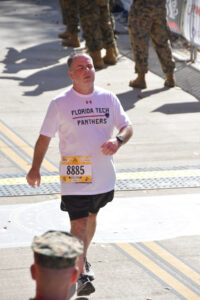
Contact Us if you would like to learn more about how we can help you or your business.
Don’t forget to follow Melanie Borden and The Borden Group on LinkedIn™ for more on all things social media marketing strategy.
When we leave military service, we need to understand that it doesn’t mean an end to our experiences (positive and negative), nor does it mean we have to stop being of service to our neighbors or nation. We take a lot with us and we need to be prepared for the new environment with a solid body and mind. Many of us struggle with the next path and the truth is we also let a lot of things ‘go’; our physical health in particular suffers immediately and over time our mental state can as well. Taking upon ourselves a conscious effort to train our body and mind to maintain strength, and ultimately forget a new purpose beyond the military.
When I left the Navy, in 2015, I had a lot of questions about what to do with the next stage of my career. I had been in the Navy for 20 years, had only ever wanted to be IN the Navy, and really didn’t WANT to get out of the Navy. I had skills that translated well to the corporate world, I just wasn’t sure what to do within that world. I had been dealing with depression and anxious thoughts exacerbated by a lifetime’s worth of traumas that saw me diagnosed with Post-Traumatic Stress Disorder (PTSD) and prescribed a variety of medications. I had attempted suicide earlier in my career and while I would never try again, I again hit low points after my time in the Navy. It took a few years and I was finally able to identify a process that has allowed me to recover from my depression, identify a plan ahead, and focus my career again for productive service to the community.
I finally found a solution to the transition issues of mental lows and physical weight highs. On December 29, 2019 I stepped on the scale and saw a number well above the maximum I’d ever said I would see and was jolted awake! I decided then and there I had to do something ‘different’. I called an old commanding officer who had become a health coach and said these words, “I need help!” He got me on a program that helped me lose the weight and regain energy. I learned with the weight loss I needed to move as well and keep moving to help heal my mind. When we leave the military, we lose the impetus to move – even if all we did was the semi-annual physical readiness test to stay ‘in-shape”. MOVEMENT is a key first step to healing ourselves after service-related traumas.
Many of us leaving the military do not realize the impact the service had on us and in particular our MIND. We turn to drink, we get angry easily, we isolate ourselves from family and friends, etc. We do not realize that traumas, whether they be little ‘t’ or big ‘T’, have caused some of the feelings and events we experience. Little ‘t’ traumas are the accumulation of smaller stressors that compound on us over time to cause PTSD and big ‘T’ traumas are those events we normally associated with PTSD – combat experiences, sexual assault, witnessing an accident or any other smattering of experiences that can be seen in service. Unfortunately, for many veterans, it has led to an increased suicide rate. We need to be vulnerable enough to understand that something has changed within us during our service. Seeking the mental health help is a key first step. That support could be talk-therapy, eye movement disassociation and reprogramming (EMDR), neuro-stimulation, or a Vagus nerve reset (to name a few), or all of the above as was the case for me.

We are never far from the traumas that have been done to our mind and we must be ready to deal with the triggers that are associated with them. And simultaneously, we cannot always call a therapist when the triggers present themselves. We must have a method of dealing with the triggers. Meditation has long been associated with ‘silencing the brain’, but it can also be a very simple process to calm the body through simple breathing techniques. When I find myself getting stressed or feeling like I am ‘getting low’ again, I take a few deep breaths and repeat as needed until I can get somewhere away from the triggers. MEDITATION does not need to be fancy to be effective; numerous studies have shown its effectiveness from just a few deep, focused breaths.
The primary loss most of us feel when we leave the military is a loss of purpose, a why we get up in the morning, or a greater MEANING behind our daily routines and lives. It can be a little traumatic in itself to go from having everything planned out for us, to have a guaranteed paycheck, and medical and dental coverage taken care of, to having it all taken away from us sometimes very quickly. It is incumbent on us to realize that the military is a terminal career, and the sooner we figure that out the sooner we can start to plan for life after service. Whether our time in uniform is for a single term of service or a career, we have to be ready to move to another life. We learn to plan out missions in the service, we need to be planning for post service life while we are still in to be best positioned to have a purpose behind our life afterwards.
Transition from the military is a tough prospect for any servicemember – whether it is one year or forty years in uniform. Having a good foundation built on our physical and mental fitness begins the transition and will set us up for long-term success. Identifying the struggles we went through, having a plan to address them, and then pushing forward with that plan will ensure a successful transition and productive livelihood afterwards. While your transition adventure will have its own plan, for me the daily inclusion of MOVEMENT, MIND, MEDITATION, and MEANING have meant I have been able to stay focused at work and home, identify and respond to potential triggers, and continue to serve my purpose to my family, friends, neighbors, community, and nation writ large.
Want to learn more about this topic? Make sure to follow Dave Snell on LinkedIn™ and visit his website here https://snelladvisory.com/.
Contact Us if you would like to learn more about how we can help you or your business.
Don’t forget to follow Melanie Borden and The Borden Group on LinkedIn™ for more on all things social media marketing strategy.
Copyright © 2025 | The Borden Group | All Rights Reserved
